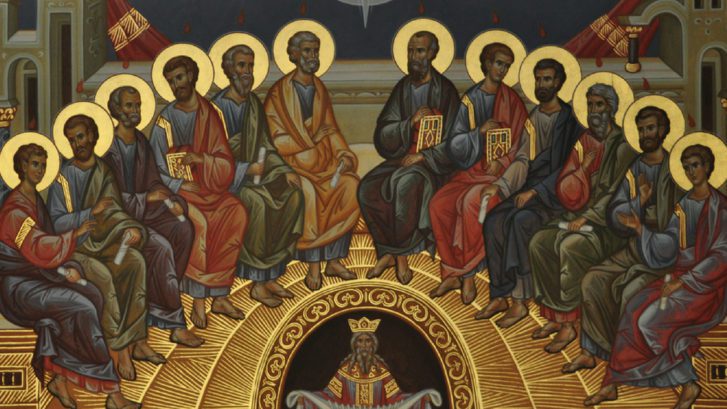Today in the Gospel we read that the disciples of Jesus were hiding. They were hiding in fear behind closed and locked doors. They were shutting out the rest of the world which was hostile, persecuting and terrifying. They felt better huddled together, in isolation and planning what to do next, and where to go.
And then, Surprise! Into their isolation, Jesus comes. Through closed doors, He walks. Their reaction must have been one of surprise, then joy as they realized who it was.
Jesus tells them to get out of their isolation and fear, and go and announce the good news. You are the bearers of the Gospel, the announcers of salvation and forgiveness. You must go, you have a mission.
But they are scared and unsure, so Jesus promises them the Holy Spirit because the Spirit will enable them to do what they cannot do themselves. The same Holy Spirit who brooded over the waters when God made heaven and earth. The same Holy Spirit who spoke through the Old Testament prophets. The same Holy Spirit who overshadowed a young girl and made her the Mother of God. The same Spirit would descend upon the Apostles in tongues of fire and transform cowards into heroes.
That was then: does this happen now? The surprise of the Spirit in a cynical age?
Let me share with you a brief synopsis of Mother Teresa’s life, who originally belonged to a community called the Sisters of Loretto, which is a cloistered teaching order. She was sent to the community school in India. It was 1947, and India became independent.
As soon as that happened, the Hindus and the Muslims slaughtered each other, it was civil war. For the first time in fifteen years, Mother Teresa left the cloister just to find food to feed the girls. That day, over five thousand had been killed, and fifteen thousand wounded. Mother Teresa came back to her cloister a changed woman. Out of fear, the sisters would not leave their convent again, but Mother Teresa said she felt the Holy Spirit calling her to do something about what she had seen. So she did something unheard of: she asked to leave the cloister to live among the people.
She moved out and found that the sick and the dying were everyday events. The turning point came when she found a woman dying on the streets. Mother Teresa went in search of help but there was no one, no hospitals, and no place to care for this woman so she took her to her small rented room, and took care of her.
Soon someone gave her a house. She gathered more poor and dying from the streets slowly at first, but then she was overwhelmed by the poor. But more volunteers came, and more houses, and now we see over 3,000 Sisters of Charity all over the world.
In the biography, Mother Teresa speaks of surprise. At her age, time and place, would she, could she do something different, be someone different? She was like the Apostles hiding behind the closed doors of her cloister. She said Christ surprised her. He came through the locked doors and breathed His Spirit on her. He called her to a second vocation.
The Spirit is full of surprises. We have to admit that secularism and affluence have muted the presence of God in our part of the world, but all is not lost. History has shown us that even in our worst moments, Jesus’ ever-present Spirit can break through and raise up saints who turn things around. They call us back to the Gospel and give us hope.
A Francis of Assisi pops up out of the moral mess of the twelfth century. Maximilian Kolbe steps forward from the Nazi madness to die a martyr. Rosa Parks says no to racial prejudice and refuses to move to the back of the bus. Nelson Mandela rejects apartheid and goes to prison for twenty years.
Ascension and Pentecost tell us that God is still present, still speaks, still sends out disciples to make a difference, and still calls. Not just the St. Francis’ and the Kolbe’s and the Park’s and Mandela’s, but you and me. What Jesus said at Ascension still remains valid and indispensable: You be My witness. We are the Church, and what we do the Church does. And what we fail to do, the Church fails to do.


